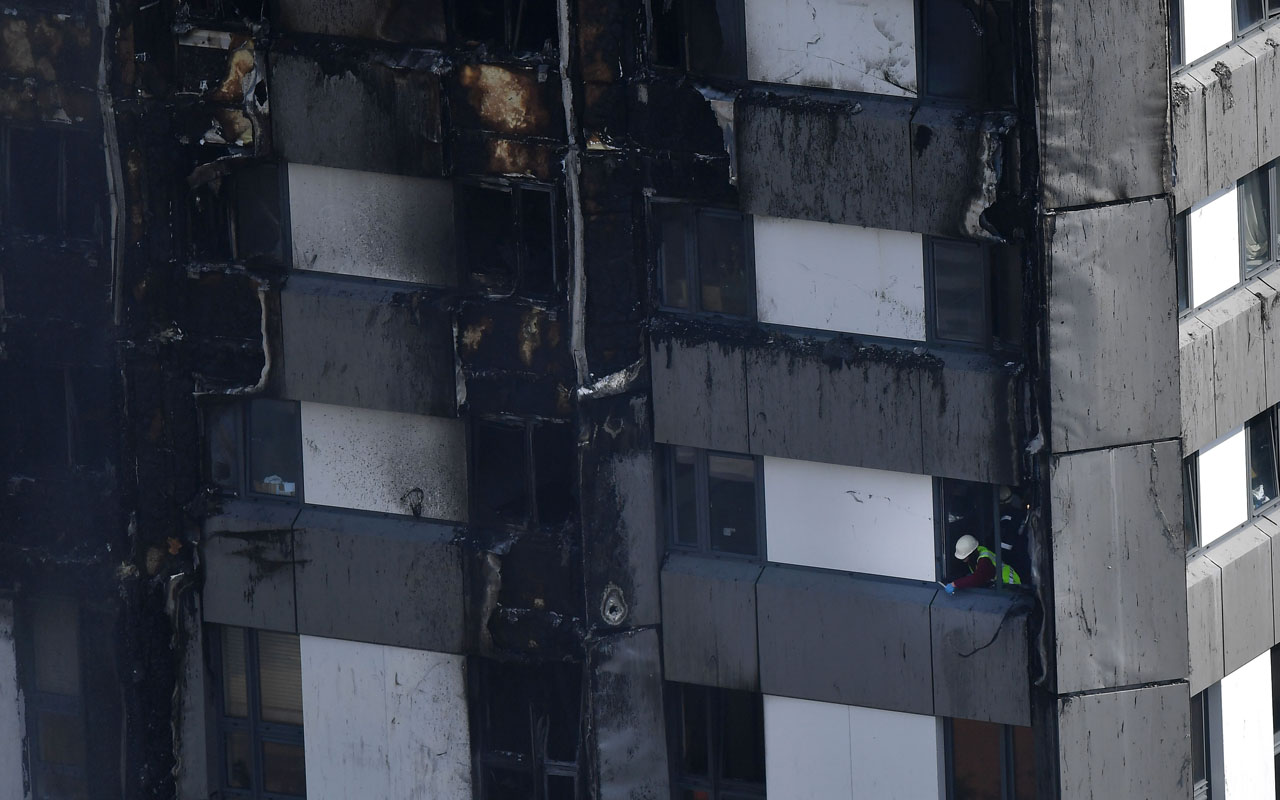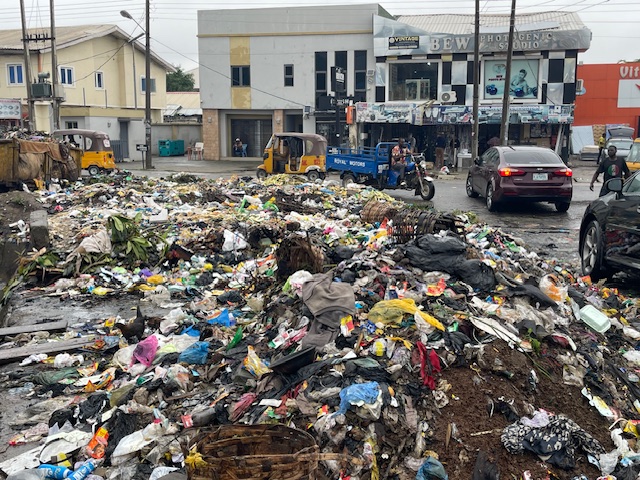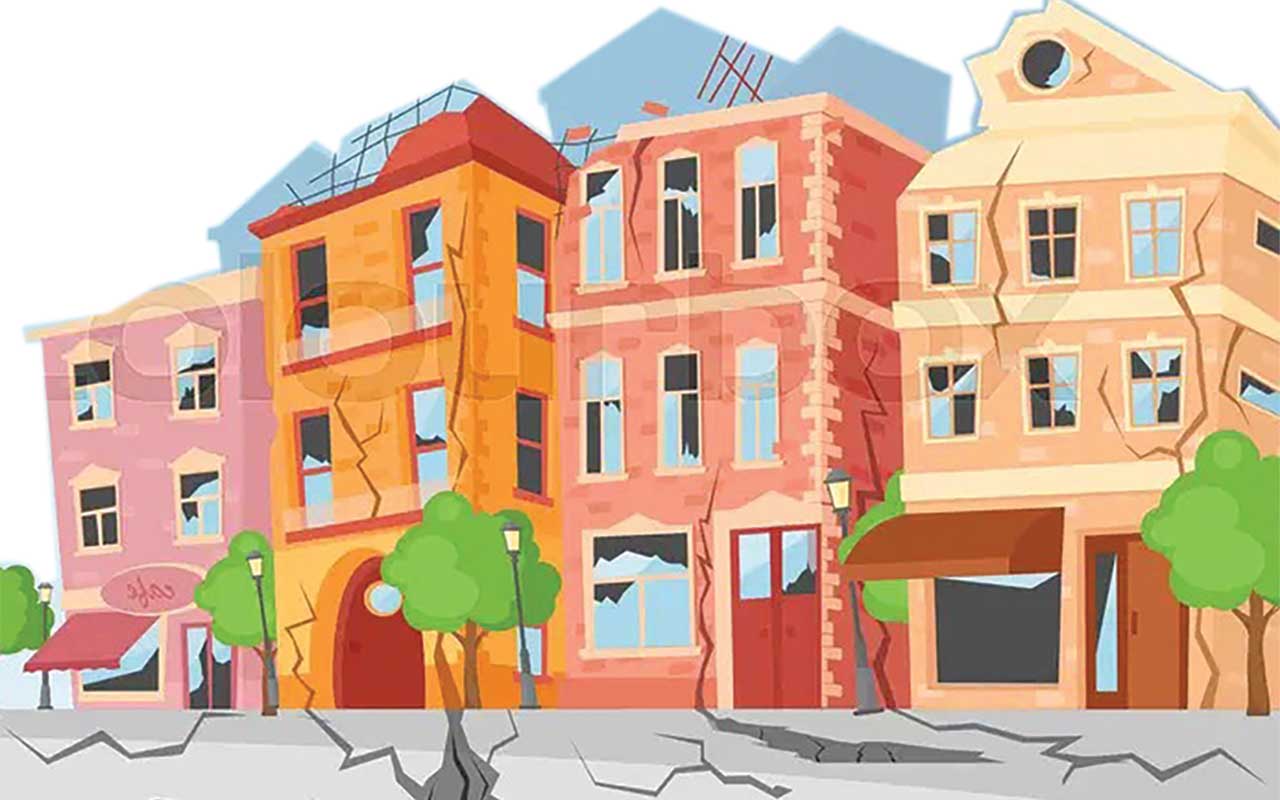
At least six people were killed Wednesday when a massive fire tore through a London apartment block overnight, with survivors voicing anger over longstanding safety fears at the 24-storey Grenfell Tower. / AFP PHOTO / Ben STANSALL
When the fire raged through the 24-storey Grenfell Tower, an apartment building in London recently, the catastrophe was monumental. The disaster, which was worsened by a lack of unexpectedness and not prevented by the fire codes, claimed at least 80 people.
While some people were still wondering what could have caused the fire, British fire engineers blamed exterior cladding that builders added to the mid-1970s structure as part of a refit.
The “thermal panels,” generally composite sandwiches of metal on the outside with extruded polystyrene or a rubberised weather barrier in the middle, are supposed to provide insulation against weather and make older buildings look nicer. But some of the best insulators are foamed hydrocarbons. “Not surprisingly, they burn pretty well,” reportedly said Alexander Morgan, head of the Applied Combustion and Energy Group at the University of Dayton Research Institute.
The London calamity has brought to the fore concerns over fire safety mechanisms and quality of exterior cladding in most of the high-rise buildings in Nigeria. Investigations by The Guardian found that some of the high-rise structures have no functional sprinklers and other fire safety devices. Where they exist, they have not been serviced for months.
Findings show that most fires in high-rises usually emanate from electrical sources largely due to incessant outages and voltage fluctuations, which spark off fire; and the negligence of occupants in the use of stoves, cookers, irons and candles.
The poor handling and storage of combustible materials like diesel and petrol around generators in buildings is quite a fire hazard. This was the case in the Mansard Insurance Building and Bookshop House fires. In the past fires like those of the NITEL building and the Independence Building, which housed the army headquarters, they were attributed to arson and sabotage.
With these experiences, it seems some high-rise building owners in major cities such as Lagos, Abuja and Port Harcourt have taken precautionary measures to secure their property from fire disaster. Our visits to 1004 Estate in Victoria Island, Union Bank Building and Mandilas Building all in Lagos revealed well-maintained sprinklers and water tanks with trained security men to coordinate emergency process in case of any fire disasters.
For instance, in 1004 Estate, the high-rise buildings have four fire escape routes, two internal and four external routes. On each of the buildings, there are also fire alarms, sprinklers and hoses on each apartment as well as industrial fire extinguishers for the lifts and transformers. But the fire extinguishers and other devices have not been serviced for months due to the disagreement over the management of the edifice.
At the 28-floor Union Bank Building, which serves as the headquarters of the Union Bank Nigeria and the second tallest building in Nigeria measuring 124.5 metres or 407 feet, there was a clear- cut fire emergency route and serviced fire extinguishers attached to each fire point on each of the floors.
Findings also showed several fire exit markings pointing to the exit routes, and electronic registration system for visitors and occupants of the building. Officials told The Guardian there is a well-programmed measure to reduce fire incidents in case of emergency and a special fire section has been created to attend to such duties.
Similarly, in Mandilas House, one of the defining landmarks in Broad Street, Lagos built over 45 years ago, there are well-maintained fire extinguishers and sprinklers attached to the fire point on every floor in the 16 -storey building. There are also water tanks attached to every floor of the commercial building owned by the Mandilas group.
Although, the fire extinguishers had February 20, 2007 as purchased date, they were recently refurbished and serviced. A stockcard attached to it, showed it was last serviced in March 2017 and due for another servicing in August.
The facility manager of the building, Mr. Segun Orowole told The Guardian that the fire fighting instruments are in top working condition to curtail any unlikely incident that could lead to the loss of revenue to the firm.He also stressed that visitors to the building are always mandated to register so they can be accounted for in case of an emergency.
The Managing Director, 1004 Estates Limited, managers of the popular 1004 Estate, Mr. Samuel Ukpong said, “the irony of Nigeria is that as the British authorities interrogate the immediate and remote factors to avert any future disasters, the Nigerian government is as usual passive or disinterested in ‘a foreign problem.’
“However, aluminium cladding wrap around many high-rises are also here and the rave material of the moment, which means that the same disaster can also happen in Nigeria and we don’t have sophisticated fire-fighting helicopters and high-rise equipment. The quality of most aluminium used here is also suspect, since many brands now come from China and there is no uniform standard or code for fire-rating of the materials in Nigeria.”
He said that the Minister of Power, Works and Housing, Babatunde Raji Fashola should order a fire-resistance test on the buildings in the country to be done by the Federal Fire Service (FFS) to know if the cladding materials used here are indeed safe. Several new and older buildings in Nigeria are now being wrapped in these materials.
“We need to strengthen the planning approval process and the materials testing labs of the government need to step up to the responsibility of codifying and approving building materials,” Ukpong stated.
For the Managing Director, Global Property and Facilities International Limited, Dr. M.K.O. Balogun, government must ensure that buildings, especially high-rise ones are certified with a maximum safety procedure.
He also stressed the need for an emergency preparation plan in such buildings, which can be done through the stimulation of an emergency situation and process of evacuation to determine the efficacy of such a plan in high-rise buildings.Recalling the London fire incident, Balogun said it was unbelievable that the total number of occupants in the building is yet to be determined in a country so advanced like the United Kingdom
The facility expert said firms in high-rise building management should have registers, where both occupants and visitors are registered to ensure that those in the buildings are accounted for in a time of emergency.Referring to the 1004 Estate with multiple storey buildings, Ukpong disclosed that funding the facility management of such buildings to prevent and fight fires could be expensive. But he said that such an investment is quite critical to safeguard the buildings, as the cost of a total loss of the property through fire is definitely higher.
“Many property owners and tenants unfortunately do not even think of the safety of their own lives and property when reducing fire-fighting equipment and prevention budgets in service charges because they think fire cannot happen in their buildings.
“The building should also be insured against fire and special perils at the very least even though our experience has shown that the buildings’ contents and the provision for the cost of temporary hotel or alternative accommodation should also be included in the insurance cover because repairing burnt buildings or apartments can take months,” he said.
Ukpong stressed that architects and engineers need to examine the appropriate safety features to incorporate in their material specifications and designs.Supporting this, the President, Association of Consulting Architects of Nigeria (ACAN), Kitoyi Ibare-Akinsan revealed that to prevent such devastating fire accidents, builders need to use non-combustible building materials, provide fire doors for fire containment and means of escape including fire stairs as well as educate residents on effective fire drills.
However, he said the incident should offer Nigeria an opportunity to look at the state of property insurance regulations. According to him, no matter the cause of this disaster the insurance industry stands to pay out a lot of compensation based on policies that must have been taken.
“Nigeria should look at the use of mandatory all-risk insurance taken appropriately to cover all building projects during construction and occupation. This will create the essential awareness as well as protection required in the construction industry.
“This may be one way to sanitise the construction industry and its devastating accidents, as presently there is not enough force to compel everyone to do the right thing,” Ibare-Akinsan said.On the level of preparation of the fire service, the Federal Fire Service Spokesperson, Collins Elechi, said the agency is well prepared to handle such an incident in the country.
His optimism is based on what he called the commitment of the current leadership to the safety of lives and property. He, however, advised owners of high-rise buildings to use fire-resistant materials in construction, saying this would contribute well in curtailing fire incidents.
According to him, his agency is 24 hours ready but there is the need to increase the level of responsiveness since any fire starts from an insignificant source before it becomes an inferno.
He said Nigerians should be friendly with fire servicemen and have their phone numbers because reaching fire servicemen is crucial to any rescue.He maintained that though the fire service has been uplifted with modern fire-fighting equipment that can go above 15 floors, renovation is still key, as there is still the need to improve in the facilities of the agency.
“We should still need to update and improve many of our trucks, by refurbishing them and ensuring that hydrological facilities are available at all times. In terms of equipment, we have them and we are still waiting to take delivery of some in a couple of weeks.“There is also the need to create additional fire service stations domiciled in councils to create proximity to the stations to improve on the time of responsiveness”, he said.
The fire service, according to him, is also doing a lot to ensure that fire hydrants are available all times in order to refill the fire ports to extinguish fire in case of fire incident. “We are ready to salvage the situation. And we are expecting more delivery of equipment”, he added.
The managing director, 1004 Estates advised that the users of buildings should look out for visible and adequate number of fire extinguishers, multiple fire alarm points, fire sprinklers, fire hoses and alarm bells, sand buckets, clearly marked fire exits and fire assembly points.
The experts believe that the prevention of high-rise fires is always the first emphasis in electrical and mechanical design philosophy, which is best achieved by choosing qualified and experienced consultants with existing buildings with a good fire track record. They urged the Federal Government to ensure the Federal Fire Service is also revamped like was done in Lagos to make it effective.






